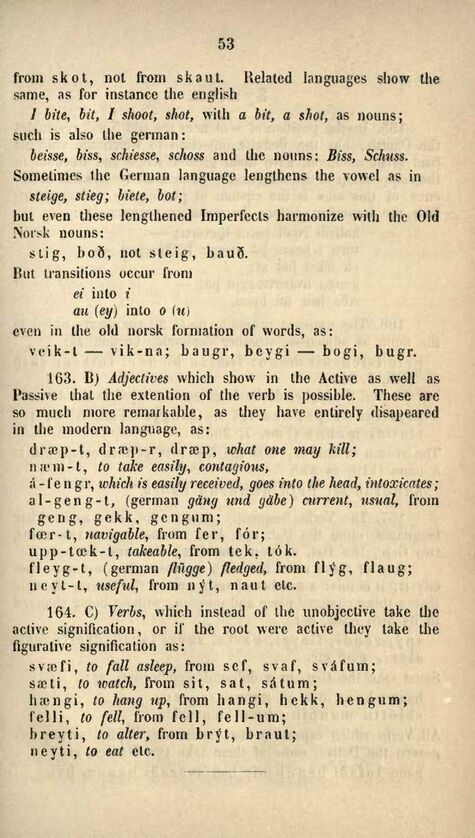
Full resolution (JPEG) - On this page / på denna sida - Part I - The Formation of Words

<< prev. page << föreg. sida << >> nästa sida >> next page >>
Below is the raw OCR text
from the above scanned image.
Do you see an error? Proofread the page now!
Här nedan syns maskintolkade texten från faksimilbilden ovan.
Ser du något fel? Korrekturläs sidan nu!
This page has been proofread at least once.
(diff)
(history)
Denna sida har korrekturlästs minst en gång.
(skillnad)
(historik)
from skot, not from skaut. Related languages show the
same, as for instance the english
I bite, bit, I shoot, shot, with a bit, a shot, as nouns;
such is also the german:
beisse, biss, schiesse, schoss and the nouns: Biss, Schuss.
Sometimes the German language lengthens the vowel as in
steige, stieg; biete, bot;
but even these lengthened Imperfects harmonize with the Old
Norsk nouns:
stig, boð, not steig, bauð.
But transitions occur from
ei into i
au (ey) into o (u)
even in the old norsk formation of words, as:
veik-t – vik-na; baugr, beygi – bogi, bugr.
163. B) Adjectives which show in the Active as well as
Passive that the extention of the verb is possible. These are
so much more remarkable, as they have entirely disapeared [[** NB sic = -pp- ?? **]]
in the modern language, as:
dræp-t, dræp-r, dræp, what one may kill;
næm-t, to take easily, contagious,
á-fengr, which is easily received, goes into the head, intoxicates;
al-geng-t, (german gäng und gäbe) current, usual, from
geng, gekk, gengum;
fœr-t, navigable, from fer, fór;
upp-tœk-t, takeable, from tek, tók.
fleyg-t, (german flügge) fledged, from flýg, flaug;
neyt-t, useful, from nýt, naut etc.
164. C) Verbs, which instead of the unobjective [[** sic, = unactive e.l.?: dansk Gjo. = gjerningsord/objekt? som antage indvirkende betydning istf gjenstandsløs (betydning?) **]] take the
active signification, or if the root were active they take the
figurative signification as:
svæfi, to fall asleep, from sef, svaf, sváfum;
sæti, to watch, from sit, sat, sátum;
hængi, to hang up, from hangi, hekk, hengum;
felli, to fell, from fell, fell-um;
breyti, to alter, from brýt, braut;
neyti, to eat etc.
<< prev. page << föreg. sida << >> nästa sida >> next page >>